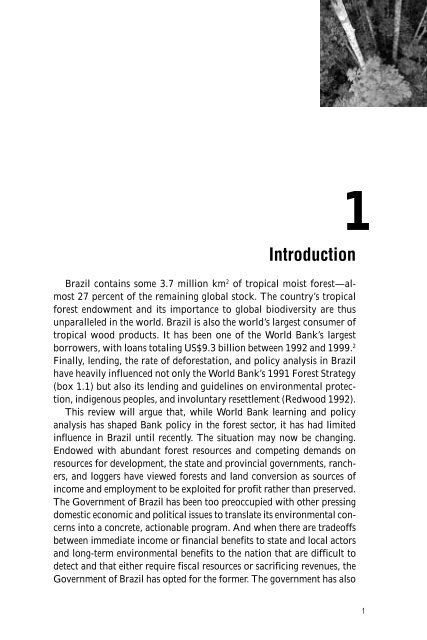Download Report - Independent Evaluation Group - World Bank
Download Report - Independent Evaluation Group - World Bank
Download Report - Independent Evaluation Group - World Bank
Create successful ePaper yourself
Turn your PDF publications into a flip-book with our unique Google optimized e-Paper software.
Introduction<br />
1<br />
Brazil contains some 3.7 million km 2 of tropical moist forest—almost<br />
27 percent of the remaining global stock. The country’s tropical<br />
forest endowment and its importance to global biodiversity are thus<br />
unparalleled in the world. Brazil is also the world’s largest consumer of<br />
tropical wood products. It has been one of the <strong>World</strong> <strong>Bank</strong>’s largest<br />
borrowers, with loans totaling US$9.3 billion between 1992 and 1999. 2<br />
Finally, lending, the rate of deforestation, and policy analysis in Brazil<br />
have heavily influenced not only the <strong>World</strong> <strong>Bank</strong>’s 1991 Forest Strategy<br />
(box 1.1) but also its lending and guidelines on environmental protection,<br />
indigenous peoples, and involuntary resettlement (Redwood 1992).<br />
This review will argue that, while <strong>World</strong> <strong>Bank</strong> learning and policy<br />
analysis has shaped <strong>Bank</strong> policy in the forest sector, it has had limited<br />
influence in Brazil until recently. The situation may now be changing.<br />
Endowed with abundant forest resources and competing demands on<br />
resources for development, the state and provincial governments, ranchers,<br />
and loggers have viewed forests and land conversion as sources of<br />
income and employment to be exploited for profit rather than preserved.<br />
The Government of Brazil has been too preoccupied with other pressing<br />
domestic economic and political issues to translate its environmental concerns<br />
into a concrete, actionable program. And when there are tradeoffs<br />
between immediate income or financial benefits to state and local actors<br />
and long-term environmental benefits to the nation that are difficult to<br />
detect and that either require fiscal resources or sacrificing revenues, the<br />
Government of Brazil has opted for the former. The government has also<br />
1

















